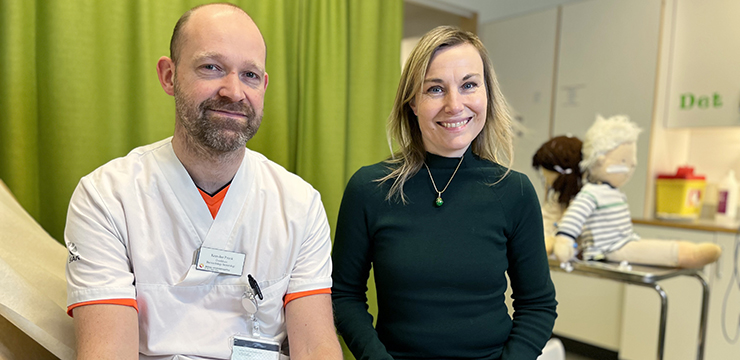Children with leukaemia to gain access to equal treatment via European project coordinated by Skåne University Hospital

In Sweden, about 15 children contract acute myeloid leukaemia (AML) every year. This is a serious form of blood cancer that involves intensive treatment with cytostatic drugs, and in some cases a bone marrow transplant is required. The prognosis is relatively good, and almost 80% of children survive.
The treatment these children receive differs around the world, and this is where the CHIP-AML22 research project comes in. The project brings together 14 countries, primarily in Europe, for a treatment study that will investigate how children respond to certain types of treatment.
Kees-Jan Pronk is coordinating the EU project, assisted by Elise Witthoff, whereas the sponsor for the CHIP-AML22 is the Princess Máxima Center.
It was recently announced that the European countries taking part will receive funding via the EU’s EU4Health programme.
“The study is designed according to current knowledge about the best available treatment for children with AML,” explains Kees-Jan. “Of course, we want to be able to offer all children the type of treatment that we really believe in.”
Advanced methods
In order to provide the best available treatment to children with AML, the treatment must be adapted on the basis of two factors: the genetic changes in the cancer cells that drive the development of the leukaemia itself, and how the patient responds to the initial treatments. These two factors determine how treatment continues after the first phase.
“Not all the countries included in the study have set up these advanced methods to check genetic changes and treatment responses. However, the study will give them access to these methods now.”
Targeted drugs
The researchers will also introduce two new, more modern and targeted drugs that will hopefully increase the effectiveness of the treatment and reduce side effects.
“These drugs are also not available in all countries, or they are too expensive for some countries and can therefore not be offered to patients.”
In addition, the study will seek answers to a number of scientific questions, and the children included will be randomised to different treatment options, with the aim of increasing treatment effectiveness and reducing side effects.
“We know from past experience that this approach is highly successful, and has led to almost 80% of children with AML now being cured. Up until the mid-1970s, not a single child survived this serious disease.”
Benefits for other patient groups
The fact that the EU project is being coordinated by Skåne University Hospital brings advantages for Swedish patients, says Kees-Jan.
“We will be very closely involved in developing and improving the care received by these young patients. Some of the knowledge we gain as a result of this project may also be useful for other patient groups, both children and adults.”
About CHIP-AML22
- The name stands for Childhood International Protocol – Acute Myeloid Leukaemia 2022.
- The project is being carried out within an international consortium that includes Sweden, Finland, Denmark, Norway, Iceland, Estonia, Latvia, Lithuania, the Netherlands, Belgium, Spain, Hong Kong, Israel and Portugal.
- The Princess Máxima Center for Pediatric Oncology in Utrecht, the Netherlands, will be responsible for the scientific aspects of CHIP-AML22, with Professor Gertjan Kaspers (Utrecht) as Chief Investigator of CHIP-AML22. Skåne University Hospital coordinates the EU funding and implementation, with Associate Professor Kees-Jan Pronk as Vice-Chief Investigator of CHIP-AML22. Elise Witthoff is EU Project Coordinator.
- Uruguay and Switzerland are also likely to join the consortium. Israel, Hong Kong, Uruguay and Switzerland are not part of the EU, and therefore will not benefit from the EU4Health grant.
- The EU funding will last until the end of 2025, but the study will continue beyond then – until approximately 2030. This is because the researchers need to treat and evaluate a certain number of children in the study in order to find answers to the scientific questions.
- The project has a budget of EUR 3 million. The EU is financing 80% of the costs. The remaining costs will be borne by the local hospitals.


